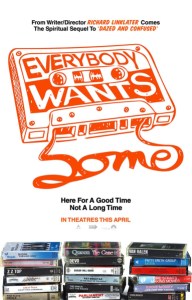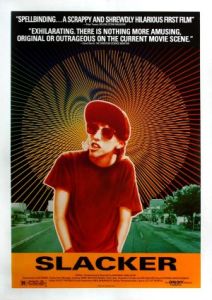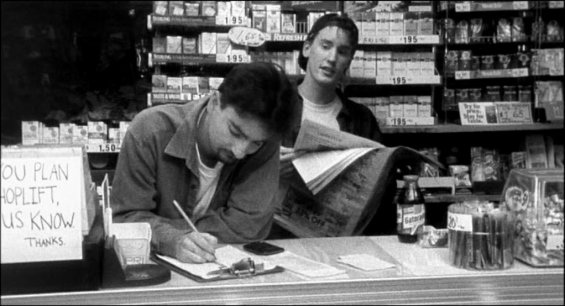 Between the mud wrestling, the promiscuous sex, the time spent driving around on the hunt for tail, playing ping pong and talking endlessly about baseball, there’s more than a little wish fulfillment going on in “Everybody Wants Some!!” Richard Linklater’s latest is actually more personal to him than his previous film “Boyhood,” an ‘80s throwback reflecting on his college days playing baseball in Texas.
Between the mud wrestling, the promiscuous sex, the time spent driving around on the hunt for tail, playing ping pong and talking endlessly about baseball, there’s more than a little wish fulfillment going on in “Everybody Wants Some!!” Richard Linklater’s latest is actually more personal to him than his previous film “Boyhood,” an ‘80s throwback reflecting on his college days playing baseball in Texas.
Linklater has grown a little skeezier than usual, turning his crop of characters into raging pussy hounds, reducing the substantive female characters to just one, laying it on thick with innumerable idioms for talking about your dick, and just a little nudity for good measure. But rather than Linklater remaking “Porky’s,” he has the depth and maturity to show that the honeymoon doesn’t last forever. If college is a place where you find yourself, Linklater knows that at some point you have to grow out of this world and find a real identity.
And that combination of low-brow male bonding and high-brow soul searching make for a near perfect comedy. Like its spiritual sibling “Dazed and Confused,” the film put a stupid grin on my face.
As in “Dazed and Confused,” you immediately get a nostalgic sense of halcyon summer days. But this time the kids are heading off to college instead of high school, the time period has been shifted to the early ‘80s, and rather than the last day of high school, “Everybody Wants Some!!” starts a few days before college classes kick off. All the while, Linklater reminds us of a ticking clock to show how childhood behavior quickly slips away. And it didn’t take him 12 years to do it either.
Jake (Blake Jenner) is a new freshman pitcher for Southern Texas University’s star baseball team. The whole squad lives together in a pair of houses, and in these cramped quarters everyone has an air of royalty, competitiveness and one-upsmanship in their dirty talk. The veteran player McReynolds (Tyler Hoechlin) says upfront that he doesn’t like pitchers and conceitedly blocks Jake’s way into the next room. One housemate is trying to fill up a water bed, but his roommate bemoans that having sex on a waterbed is like having sex on top of another really fat woman.
Linklater’s screenplay toes the line here between winking misogyny and actual bad taste, but it regardless captures the mood and spirit of that jock, locker room culture. The characters’ various quirks and their pursuit to get laid are all in good fun. Linklater doesn’t have a mean bone in his body, and while this baseball team can still fly off the handle in their competitive nature, neither do these characters.
Part of that has to do with the fact that as much as these boys ogle girls, they’re just as much looking at each other. For an article in Vulture, Kyle Buchanan recently wondered if “Everybody Wants Some!!” might accidentally be the gayest movie of the year. The fashion in Linklater’s ‘80s Texas is all short pants, cropped baseball tees, long hair and soft colors, and the boys crimp and style with the same gusto they display on the field. They’re all superficial and a tad effeminate in their bro-ey masculinity, with one even checking out his self-proclaimed “best ass on campus” in the mirror.
They spend so much time on how they look that Linklater finds a way to ease these characters into the adults they might become. In one of his Linklaterisms, the intellectual stoner Finnegan (Glen Powell) explains to young Jake that, “You bring who you are, not what they want.” Upon striking out yet again at the disco club, the boys put on some cowboy boots and try their luck at the country bar, then wander over to a punk rock show with the band playing a moshing cover of the “Gilligan’s Island” theme. “It’s not phony, it’s adaptive.” Plenty of movies have approached coming-of-age, but rarely has trying on different hats felt this cavalier, laid back and fun.
The cast of “Dazed and Confused” included early work from Ben Affleck, Matthew McConaughey, Parker Posey, Milla Jovovich and Adam Goldberg, and their complex characters and performances were signs that they’d one day be stars. The cast of “Everybody Wants Some!!” is equally rich. Between stand up work from Jenner, Hoechlin, Wyatt Russell, Glen Powell and particularly the film’s sole female character played by the luminous Zoey Deutch, it’s just a question of which one or how many will break out in the years to come.
And while “Everybody Wants Some!!” may not be the instant classic “Dazed and Confused” is, or as universal a coming-of-age story as “Boyhood,” Linklater has tapped into a time and place that many will love to revisit again and again, a smile on their face every time they do.
4 stars
 Richard Linklater was featured in a documentary with another famous director James Benning. The two were watching “Sweet Smell of Success” together, and 10 minutes before the end, as a random man speaks with Burt Lancaster, Benning made a casual joke saying, “And then we just follow that guy, right at the climax of the movie.” Linklater, who was just finishing editing “Slacker” thought to himself, “Uh oh, I just made an entire movie like that.”
Richard Linklater was featured in a documentary with another famous director James Benning. The two were watching “Sweet Smell of Success” together, and 10 minutes before the end, as a random man speaks with Burt Lancaster, Benning made a casual joke saying, “And then we just follow that guy, right at the climax of the movie.” Linklater, who was just finishing editing “Slacker” thought to himself, “Uh oh, I just made an entire movie like that.”
